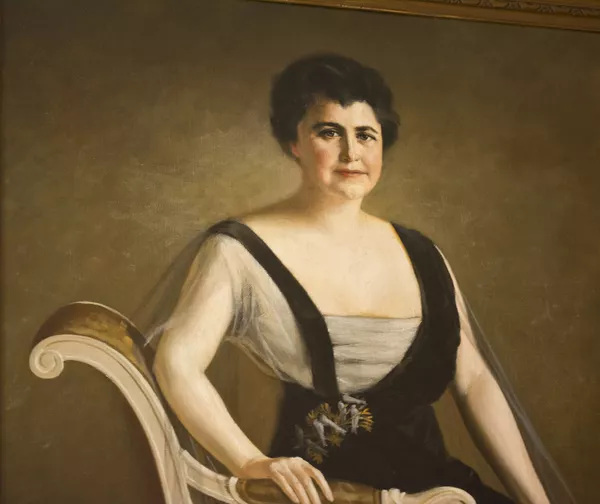Edith Wilson, The First Female President

Edith Wilson was born as Edith Bolling in 1872 in a small Virginia town. It was a really small town in the middle of the mountains. Edith was described to have a big personality, full of opinions, and fearless. She was even like this as a child. Her dad was a Circuit Court Judge. When Edith was a teenager, two men came over to her house to visit the family. While she was hanging out with them, she was uninterested in what they were doing and dared them to jump off the upstairs balcony for entertainment; they decided to do it.
The boys agreed to hang off the balcony and drop to the ground while Edith was watching them. While they were dangling off the balcony, she decided to stomp on their fingers, making them fall. Luckily for them, they did not end up getting harmed. Later on in life, Edith admitted that she did it because she thought that those two men were boring.
In this time, the 1800s, women were expected to be polite, quiet, and pretty. Edith was not like most girls because she was not afraid to let anybody know how she felt. When she was 19, she met a man named Norman Galt when she was visiting Washington D.C. He was a businessman, ran a successful jewelry shop, and was rich. She saw Norman as a way to get out of the town she was living in.
Norman and Edith would end up dating for four years and then they decided to get married. They would travel the world, go on lavish vacations, and do whatever it is that they wanted to do. At this point, Edith had her own car which was her way of showing off because cars were only for the rich at this time. Edith was the first person to get her driver’s license in Washington D.C. However, Edith was known to be a very bad driver in the neighborhood. Neighbors stated that she would drive like an absolute madwoman and she was all over the place.
Edith thought that the neighbors were jealous because she had a car and she was the one driving it. People loved her though for being an independent woman and not caring what people had to say. After five years of marriage, Norman suddenly passed away. Edith was completely heartbroken. Norman left Edith 125,000 dollars and his jewelry shop. Today this would be equivalent to over 4 million dollars.
At this point, Edith is 36 years old and a widow taking charge of the jewelry shop. It was a very successful shop and was named the Tiffany’s of Washington. It was a place people would go to be seen and it was also to get the best of the best items. Being there meant that one had lots of money. It wasn’t so much about jewelry but about show and status. Edith did not have many friends in this area because she was given the name “someone who had new money.” It was heavily frowned upon by the super-wealthy. Many people did not want to associate themselves with her because of this.
A friend of a friend was talking to Edith and was telling her that she should meet her friend because he and she have a lot in common. He lived in a big house, there was a lot of natural lighting, he is lonely, and he is super clean and white. His name was Woodrow Wilson. He was the President of the United States. Edith was not interested in dating or politics. She thought it was silly for them to bond over grief, but her friends were determined to make it happen.
The friend that was trying to get Edith with Woodrow, was Woodrow’s first cousin. One day, her friends invite Edith to get some tea and told her that they were by the White House. At this time, since one of the friends is cousins with the president, they could just walk into the White House.
Woodrow’s birth name was Thomas, but everyone called him Woodrow or Woody which was his middle name. As president, some of the big things he did was set up the Federal Reserve and the Federal Trade Commission, brought in labor laws, and raised income tax. It is important because we still feel the effects of what he did to this day. He was a master politician, super smart, very well-spoken, and always dressed for the occasion. He was married once before to a woman named Ellen. She was a soft-spoken intellectual; the opposite of Edith. She ended up passing away however in 1914.
Woodrow was the type of man who needed constant love and attention from a woman to function. He admitted multiple times throughout his life that if he didn’t have a woman, he couldn’t work at all. In relationships, Woody strived for deep connection on a personal and emotional level, having someone he could trust with his secrets, someone who was loyal, and someone who was there to reassure him that he is doing amazing.
When Edith walked into the White House, Woody described their first meeting as love at first sight. Within two months, he was writing her letters almost daily. He knew that he and Edith were meant to be together forever. He proposed to her in the letters and stated, “In this place, time is not measured by weeks or months or years, but by deep human experiences.” When Woodrow proposed, Edith had told him no. Still, Woody would write letter after letter to her to the point that he would neglect his presidential duties.
Woodrow wanted to see Edith every day and needed her to tell him that she loved him constantly. He did this with multiple women throughout his life. He was a very passionate and obsessive man, who always seemed to get what he wanted. By the summer of 1915, Edith and Woodrow are still writing letters to each other. He started to send her official government papers and in return, he was expecting her to tell him what she had thought about the issues at hand.
Edith thought this was strange because he was the president and they weren’t married; she wasn’t a politician. He was venting to her about all of his presidential issues. He was expressing the problems he was having with Congress and possible wars that were going to happen. He would also gossip about his friends and enemies. He then installed a private phone line between the White House and Edith’s place; so, he could call her and get her thoughts on what was going on; he trusted her.
She started to send and receive these confidential messages to and from European countries pretending to be the President of the United States. Edith expressed that she felt weird lying, saying she was the president. She didn’t understand why he was confiding in her like this. She had no background in politics, but he was continuously reassuring her and telling her that she was just as fit to guide him as anybody else in his inner circle was. Woody believed that even though his team was smart, they weren’t going to be as honest and transparent with him as Edith was. He loved that she was a fast-driving unfiltered mountain woman.
Edith eventually learned how to decipher secret codes for him and she enjoyed doing so. She had a photographic memory and was a very quick learner. With all of this on her side, she started to enjoy the work that she was doing. Even when Woody was being irrational, she felt comfortable enough to state her opinions on how the White House was doing certain things. She did not like to sugarcoat anything and she started to open up to Woody about everything. She would joke about how she would like to be Secretary of State since she was technically already doing his job.
One day Edith was talking to Woody about a former President who she didn’t like and how she wanted to knock his dirty teeth out. Hearing that from a woman was shocking to Woody. He would laugh because he enjoyed this side of her. Both of them loved talking bad about other people to each other. He was too nice in public because he was president and couldn’t go around not acting appropriately. He would tell her that Congress wanted to make booze illegal but half of them are alcoholics. It is said that the two of them would have slumber parties at the White House and giggle all night.
In September of 1915, Woody was ready to propose to Edith again. This time, she had said yes. Woody was so excited and right away, went to the press to announce their engagement and the press was thrilled for him. Woody was liked by people at this time and they were heartbroken when his first wife died. Seeing him happy again would make everyone else happy.
When word got out about the proposal to the media, the press decided to use this new invention, the motion picture camera to the fullest potential. They went out and followed Edith capturing her every move. This invented the paparazzi. The press got footage of her walking her dog.
Not everyone was excited for Edith and Woodrow. In Woodrow’s inner circle, they were worried about Woody getting married so soon after Ellen had passed away. They thought that the public would turn against him because it wasn’t a good look. Woody’s closest advisor, Joe Tumulty, was not very fond of Edith. He did not like Edith from the start and he thought she was very rude. Woody could not be stopped however from following his heart. One of Joe’s biggest concerns was that Woody’s marriage would hurt Woody’s re-election chances, which would cause him to lose his job.
Joe did his best to try and stop the whole wedding. He told Woody that he did not think that it was a good idea to get married to Edith. Woody listened but didn’t take anything he said to heart. He was in love with Edith and was going to marry her no matter what. After Joe tells Woody this, Woody went straight to Edith telling her everything that Joe had told him. Edith did not let this go. She would constantly belittle Joe calling him common (common was a rich woman’s way of calling someone basic and a peasant).
Joe was not the only one who did not want Woody to get married. It was everybody within Woody’s inner circle that did not want them married. Letters were found by the president’s people addressed to Woody from another woman. This woman’s name was Mary Peck. There were around 200 of these letters and it seemed as if this was going on for years. This is what they needed to get Edith out of the White House. They thought it would be a good idea to blackmail Woody about these letters from this other woman.
In 1907, Mary was on vacation in Bermuda and she ran into Woody. She was a well-known socialite and had lots of money. Since they came from the same social circle, she went up and talked to Woody. They got along very well and thought to keep in touch with each other after their vacation. They wrote letters back and forth to each other for years. They were both very open and vulnerable with one another. Mary confessed to Woody about how unhappy she was in her marriage. Woody would keep Mary a secret from his first wife.
He kept going back to Bermuda every winter while his wife stayed home and painted. It is not 100% known that Woody and Mary were having an affair, but many believed that they were. The letters seemed credible because, at one point, Mary had hit some hard times. She had finally got divorced from her then-husband causing her to end up completely broke. In one of her letters to Woody, she had asked him for financial help. He had no problem sending her money. He had offered her $1,500 to go towards what she needed. “If Edith was overwhelmed when the president insisted they get married, his political advisors were downright alarmed. Not only was Wilson entrusting this woman he’d only met three months earlier with classified information, he was up for re-election in 1916 ” They feared that marrying Edith only one year after his first wife’s death would lead to his death. They crafted a plan that would generate a series of fake love letters as if they were from Wilson to Mary Peck who Woody had a love affair of the heart with. They thought that this would humiliate Edith and she would run away if they leaked the letters to the press. When Woody was faced with the idea that Mary may have written him a blackmail letter, he believed it. At this time, Woody knew how bad it looked for him (Edith Wilson).
When Woodrow was told about this blackmail letter, he freaked out. Without hesitation, he sprinted to Edith and told her everything. He went into great detail about his relationship with Mary but Edith didn’t really care because this happened before he was with her. Woody’s people tried to sabotage the wedding and made up the blackmail letter to get Edith out of the White House. In December of 1915, Woodrow and Edith would officially become husband and wife. Woody was one of three presidents to get married during his administration. The wedding was a big deal and the press loved Edith.
“For most of the six months between late December 1918 and June 1919, our 28th president was in Europe negotiating the Treaty of Versailles and planning for the nascent League of Nations, efforts for which he was awarded the 1919 Nobel Peace Prize (an award he did not officially receive until 1920). Back home, however, the ratification of the treaty met with mixed public support and strong opposition from Republican Senators, led by Henry Cabot Lodge (R-Mass.), as well as Rich Catholic Democrats. As the summer progressed President Wilson worried that defeat was in the air.” Edith would sit next to Woodrow at his desk as he got daily briefings. She would sit in his meetings and help him write his speeches. In 1916, Edith and Woody won reelection. Many people think that Woody would not have won without Edith. Now, World War I started and Woody hated war. He wanted to travel across the country and tell the Americans to pressure their local politicians to support world peace. Traveling the country was hard for him considering he was 62 years old at this point (Dr. Howard Markel).
One day while Woody was giving a speech in Colorado, mid-sentence, he collapsed. He was sent back to D.C. to get some rest: “Late on the evening of September 25, 1919, after speaking in Pueblo, Colorado, Edith discovered Woodrow in a profound state of illness; his facial muscles were twitching uncontrollably and he was experiencing severe nausea. Earlier in the day, he complained of a splitting headache.” The minute that he got back, he suffered a stroke. The stroke left him paralyzed with no function over the left side of his body and he was bound to a wheelchair. He could not talk for more than a few minutes before his voice became too weak to continue with what he was saying. Edith stayed with her husband and was taking care of his every need. Oftentimes, she would speak for him telling people what he thinks or what she thinks he wanted. Edith was not trying to take power from him but wanted to ensure Woody kept his power. It didn’t stop people from claiming that Edith was some kind of political opportunist, somebody that wanted to be the first female president of the United States. She made a few major decisions while Woody was in recovery. She did not tell the public the true nature of his condition and would not allow visitors to come and see him. She would hide this information from the people, and the press (Dr. Howard Markel).
Doctors who were taking care of Woodrow would tell people that he was recovering from a nervous condition because they did not want the vice president to know or he would become president. Edith would prop Woody up at his desk making it look like he was working. There is a picture taken that showed he was propped up with a pencil in his hand to make it look like he was writing while Edith was hovering right over him. She did not want the title of president but she wanted the power. People were getting concerned that no one had heard from the president in a while, so rumors started to spread. One press was suggesting that the president had gone absolutely insane and that there were bars on his window to keep him from escaping. There were actually bars on Woodrow’s window, but they have always been there and no one noticed before.
Edith was in charge of what information came to the president and filter out what she didn’t feel had much importance or that he didn’t need to know. In this way, she had a ton of power. She spent nearly all of her time in her husband’s room watching over him. The country was in need of a leader. Having just come out of World War I inflation and unemployment was high. This wasn’t looking good for Woody. His doctors stated that if he resigned, he would have no motivation to get better, but if presidential problems were too difficult for his weak mind to deal with, it could make his condition worse. Edith decided to take care of Woody in office and be the person to push his agenda forward without overexposing him to information.
Joe starts to get suspicious because he had been sending the president letters and getting no response back. He then realized that he had not seen the president in over a month. He wrote a letter to Edith demanding that the president sit down for a meeting with him. So, all three of them sat down and started talking about how to best help the country. Edith transcribed Woody’s thoughts into a series of letters that were then given to Congress to work out. These letters were suspicious to everyone. In one of the letters, the word America was misspelled and Edith was known for not being a great writer. There was no real proof that Edith was doing something illegal so nobody could do anything about it.
There was no television or radio at this time, just newspapers; so, Americans were used to not seeing the president or having any insight as to what was going on, but Washington insiders knew something was going on. They were confused as to why the president suddenly stopped responding to problems he used to be able to handle in the morning. Months were passing and simple things were stacking up and nothing was getting done. There were many empty positions at the White House that were never filled and 28 bills became law without the president’s signature.
Previous appointments that the presidents had, were being ignored or canceled altogether. Edith was struggling with her new position. The press was spreading rumors as to what they thought was going on in the White House. Most people settled on the idea that Edith was the one helping the president more than she should. Since Woody wasn’t responding to anything, people started going after Edith directly. Nobody wanted a woman in charge. During a congressional meeting, a senator stood up and stated that they should all stop and take a break because the country was being run by a presidentress. He was complaining that there was a woman in charge and there needed to be something done about it. One time, the Secretary of State went to Congress trying to discuss the president’s stroke. When this got back to Edith, “the president” fired him.
While Edith was around, she got women the right to vote. Edith hated women’s rights and she did not like the idea of women voting just like many rich white women of the era. She once referred to the women fighting for this cause as disgusting creatures and made it a point to let everybody know that she was not in any way related to or supporting the feminist movement. It was her husband who pushed for women’s voting rights. Edith did not like supporting other women. Despite his illness, Woody wanted to run for a third term with Edith’s help which was legal at the time. The leaders of his political party did not think that Woody should run for his third term. It seemed to break Woody’s soul because he couldn’t reelect and two years later, Woody passed away.
For the rest of her life, Edith would be the protector of Woody’s legacy and would defend the work he did as president. She passed away almost 40 years after Woody did in 1961. She never remarried and she never ran for office but did stay involved in party politics. It wasn’t until 1967 that the 25th amendment was added explaining what the country needs to do when a president dies or becomes disabled. It is said that Woody’s last words were him calling himself a broken piece of machinery.
C.A. (2016, March 10). Edith Wilson: The First Lady Who Became an Acting President — Without Being Elected. Biography. Retrieved May 15, 2022, from https://www.biography.com/news/edith-wilson-first-president-biography-facts
Edith Bolling Galt Wilson. (n.d.). The White House. Retrieved May 15, 2022, from https://georgewbush-whitehouse.archives.gov/history/firstladies/ew28-2.html
Markel, D. H. (2015, October 2). When a secret president ran the country. PBS News Hour. Retrieved May 15, 2022, from https://www.pbs.org/newshour/health/woodrow-wilson-stroke
Monson, H. (2016, July 4). Women in the White House: How Gender-Based Obstacles Affected Edith Wilson and Hillary Rodham Clinton While First Ladies. Digital Commons. Retrieved May 15, 2022, from https://digitalcommons.spu.edu/cgi/viewcontent.cgi?article=1056&context=honorsprojects
Saunders, F. W. (1979). Love and Guilt: Woodrow Wilson and Mary Hulbert. American Heritage. Retrieved May 15, 2022, from https://www.americanheritage.com/love-and-guilt-woodrow-wilson-and-mary-hulbert

Hi! My name is Cynthia Wing. I am 15 years old and in 10th grade. This is my first year on the Spud. I am the daughter of Maria and Henry (step-dad)...











Amb • Sep 8, 2023 at 10:38 pm
Isn’t this the transcript from Bailey Sarien’s podcast from 9/30/21?